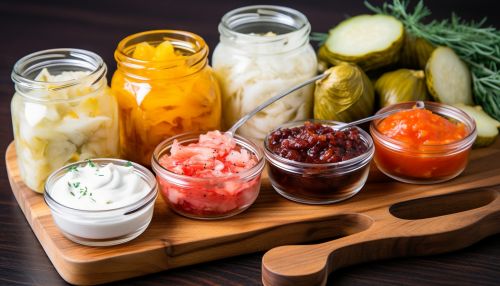Probiotics in Fermented Foods
Introduction
Probiotics are live bacteria and yeasts that are beneficial for health, especially the digestive system. We usually think of bacteria as something harmful, but our body is full of bacteria, both good and bad. Probiotics are often called "good" or "friendly" bacteria because they help keep our gut healthy. They are naturally found in our body, but can also be found in certain foods and supplements. One of the most common ways to consume probiotics is through fermented foods.


Fermented Foods
Fermentation is a metabolic process that converts sugar to acids, gases, or alcohol. It is used in many food production processes, including the making of yogurt, cheese, wine, beer, and fermented foods like sauerkraut and kimchi. Fermentation helps to preserve food, enhance its flavor, and increase its nutritional value. It also encourages the growth of beneficial bacteria, known as probiotics.
Probiotics in Fermented Foods
Many fermented foods are a good source of probiotics. These include:
- Yogurt: This is one of the best sources of probiotics. It is made by fermenting milk with different bacteria, which give yogurt its texture and tangy flavor.
- Sauerkraut: This is fermented cabbage and it is rich in probiotics and vitamins.
- Kimchi: This is a traditional Korean dish that is made from fermented vegetables, mainly cabbage and radishes, and spices.
- Kefir: This is a fermented milk drink that is made with kefir grains, which are a combination of bacteria and yeasts.
- Pickles: These are cucumbers that have been pickled in a solution of salt and water. They are left to ferment for some time, which makes them sour and a good source of probiotics.
Benefits of Probiotics
Probiotics have many health benefits. They can help balance the friendly bacteria in your digestive system, prevent and treat diarrhea, improve mental health conditions, keep your heart healthy, reduce symptoms of certain digestive disorders, boost your immune system, and help you lose weight and belly fat.
Conclusion
Including fermented foods in your diet is a great way to increase your intake of probiotics. They not only improve your gut health, but also have other health benefits. However, it is important to note that not all fermented foods contain probiotics, as the fermentation process may sometimes kill these beneficial bacteria. Therefore, it is always best to check the label to ensure that the product contains live and active cultures.
